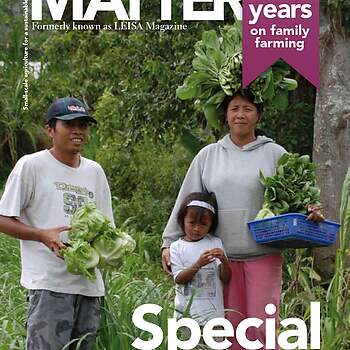In the 1920's Sir Albert Howard's pioneering work organic agriculture introduced ecological principles such as composting, crop rotation and soil health, laying the foundation for agroecology and sustainable agriculture.
At the World Conference on Agrarian Reform and Rural Development (1979) the Peasants; Charter was affirmed by the UN, highlighting the rights to sustainable agriculture and rural development.
In the 1970's the concept of food souvereignty, defined as the right of communities to control their food systems and equitable access to resources such as land. For small scale farmers, challenges included land access, high cost of inputs, neglect and heavy reliance on subsidies.
The Centre for Learning on Sustainable Agriculture (ILEIA), established in 1982, was an independent organization based in the Netherlands that supported agro-ecological approaches and family farming. In 1984 the LEISA (low external input sustainable agriculture) magazine was launched to share ideas onlow input farming and agro-ecology to promote sustainable agriculture, particularly for small scale farmers.
LEISA and family farming were explicitly mentioned by the Dutch Minister for Development Cooperation, Jan Pronk, in 1990.
Over time, agro-ecology has expanded from a narrow focus on the ecological interactions in farming systems to encompass a broader interdisciplinary framework that includes sustainability, social equity, climate resilience and food souvereignty.
Although there was limited direct support (funding) in Dtuch development cooperation for agro-ecology as such, the Wageningen University has integrated agro-ecological principles into regenerative agriculture approaches. Regenerative agriculture is a holistic approach to farming that seeks to restore and enhance the health of ecosystems through practices like crop rotation, reduced tillage and organic inputs, focussing on soil regeneration and biodiversity enhancement.
Resources
Altieri, M.A. & Toledo, V.M., (2011) The agroecological revolution in Latin America, Rescuing nature, ensuring food souvereignty and empowerking peasants. The Journal of Peasant Studies, 38 (3), 587-612
Ministry of Agriculture, Nature and Food Quality (2018) Dutch Climate Agreementj
Pretty, J. (1995) Regenerating Agriculture: Policies and Practices for sustainability and Self Reliance
Giller, K.E., Hijbeek, R. Andersson, J.A. & Sumberg, J. (2021) Regenerative Agriculture: An agronomic perspectives. Outllook on agriculture 50 (1), 13-25
